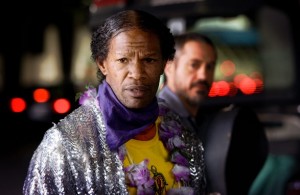n Focus by Richard Crouse IN FOCUS April 24, 2009
 Mark Twain understood basing stories on real events wouldn’t necessarily mean a tale couldn’t have its own flights of fancy.
Mark Twain understood basing stories on real events wouldn’t necessarily mean a tale couldn’t have its own flights of fancy.
“Truth is stranger than fiction,” he said, “but it is because fiction is obliged to stick to possibilities; truth isn’t.”
In simpler terms he means that just because something is far fetched doesn’t mean it didn’t happen. For example, if a screenwriter came up with the colourful idea that a homeless man, dressed like a superhero was a musical genius who believed Beethoven was the “leader of Los Angeles” you’d scream “Codswallop!” That is until you see the real life account of Nathaniel Ayers, subject of The Soloist, in theatres this week.
What did Ayers, a schizophrenic man with a larger than life personality, think of Jamie Foxx’s portrayal of him? He was, said Mr. Ayers, “a good Nathaniel.”
Another real life character, John Wojtowicz, who robbed a bank to pay for his lover’s sex change operation, earned $7,500 for the movie rights for his outlandish story. The resulting movie, Dog Day Afternoon, only got 30 per cent of the facts right, Wojtowicz said, but he added that “Al Pacino’s performance has to be called ‘out of sight…’ his characterization was flawless.”
Of course some movies don’t even get 30 per cent of the story right.
Who could forget Morgan Freeman as Joe Clark, Lean on Me’s tyrannical high school principal? On screen armed with a bullhorn and determination he led the rowdy students of New Jersey’s Eastside High School to their highest test scores ever. It was an inspirational movie, but the real life story isn’t quite as stirring. Screenwriters kept the extraordinary aspects of Clark’s story — his use of bullhorns in class and penchant for extreme discipline — but inflated his accomplishments. Despite his notable efforts, test scores didn’t go up.
When asked about the exaggerations in the “based on a true story” account of his life Clark said, “It’s entertainment. And the design of entertainment is to make people happy. There’s enough sadness in one’s life. Once in a while you must extract a reasonable facsimile of glee, as factitious as it may be.”
Sometimes, in the “design of entertainment” the words “Based on a True Story” are completely meaningless. In its opening credits Fargo claimed to be a true story, but it’s actually not. Why make claims to realism then? “If an audience believes that something’s based on a real event,” said co-director Joel Coen, “it gives you permission to do things they might otherwise not accept.”
Mark Twain would have understood.
